Importance of Media in Modern Day Politics and Communication
VerifiedAdded on 2021/05/27
|8
|2472
|268
Essay
AI Summary
This essay delves into the crucial role of media in contemporary politics, examining the shift from mainstream media to the prominence of social media platforms. It explores how political communication has evolved, with politicians increasingly utilizing social media to connect directly with the public, challenging the traditional role of mainstream media. The paper discusses the symbiotic relationship between media and political institutions, highlighting how both rely on each other for audience reach and information dissemination. It analyzes the impact of social media, such as Twitter, on political reporting and the evolving roles of journalists and politicians. The essay references various studies and experts to provide a comprehensive understanding of the dynamic interplay between media, politics, and public engagement, ultimately arguing for the continued significance of media in shaping political discourse and public opinion. The essay also highlights the changing roles of the media and politicians in the digital age.
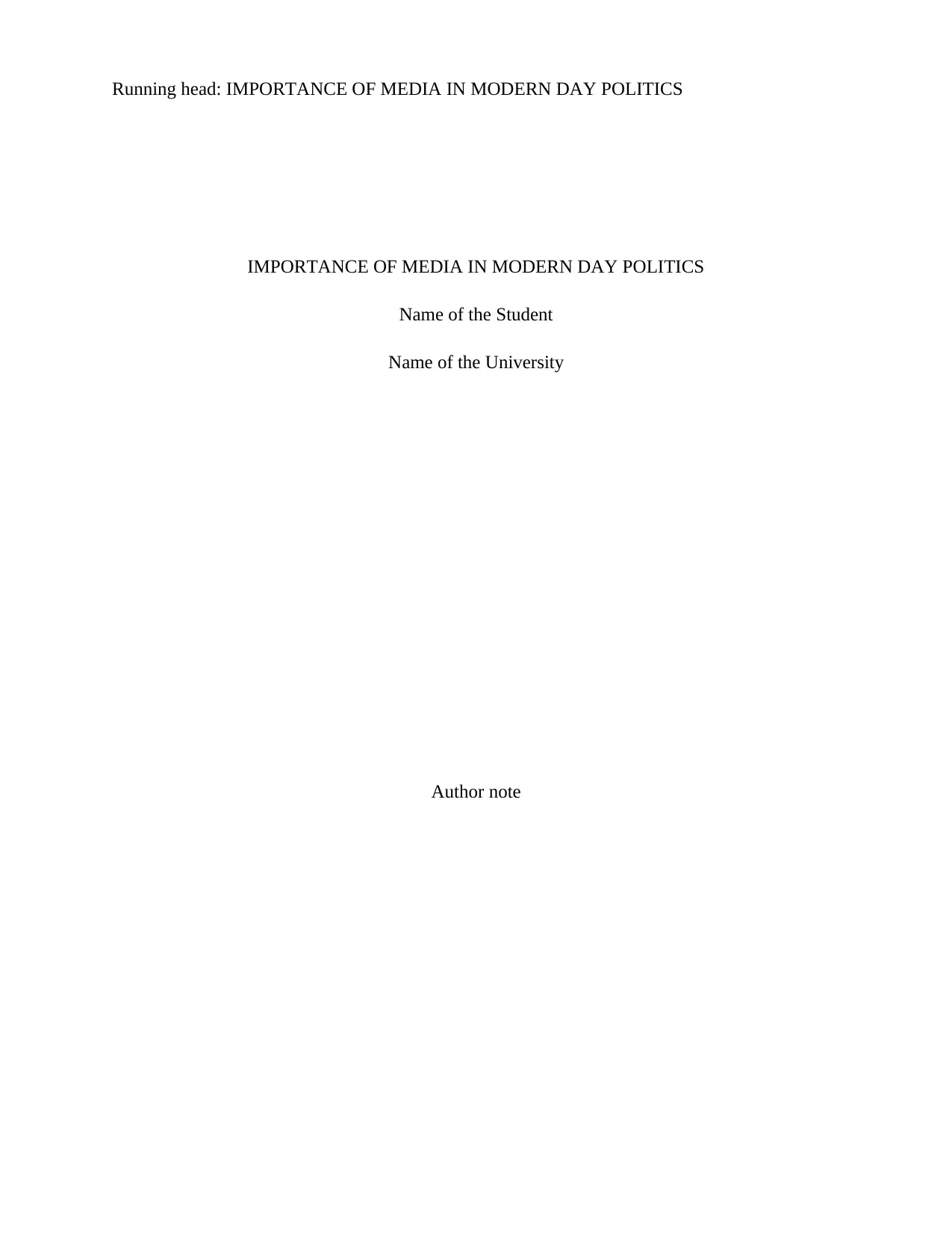
Running head: IMPORTANCE OF MEDIA IN MODERN DAY POLITICS
IMPORTANCE OF MEDIA IN MODERN DAY POLITICS
Name of the Student
Name of the University
Author note
IMPORTANCE OF MEDIA IN MODERN DAY POLITICS
Name of the Student
Name of the University
Author note
Paraphrase This Document
Need a fresh take? Get an instant paraphrase of this document with our AI Paraphraser
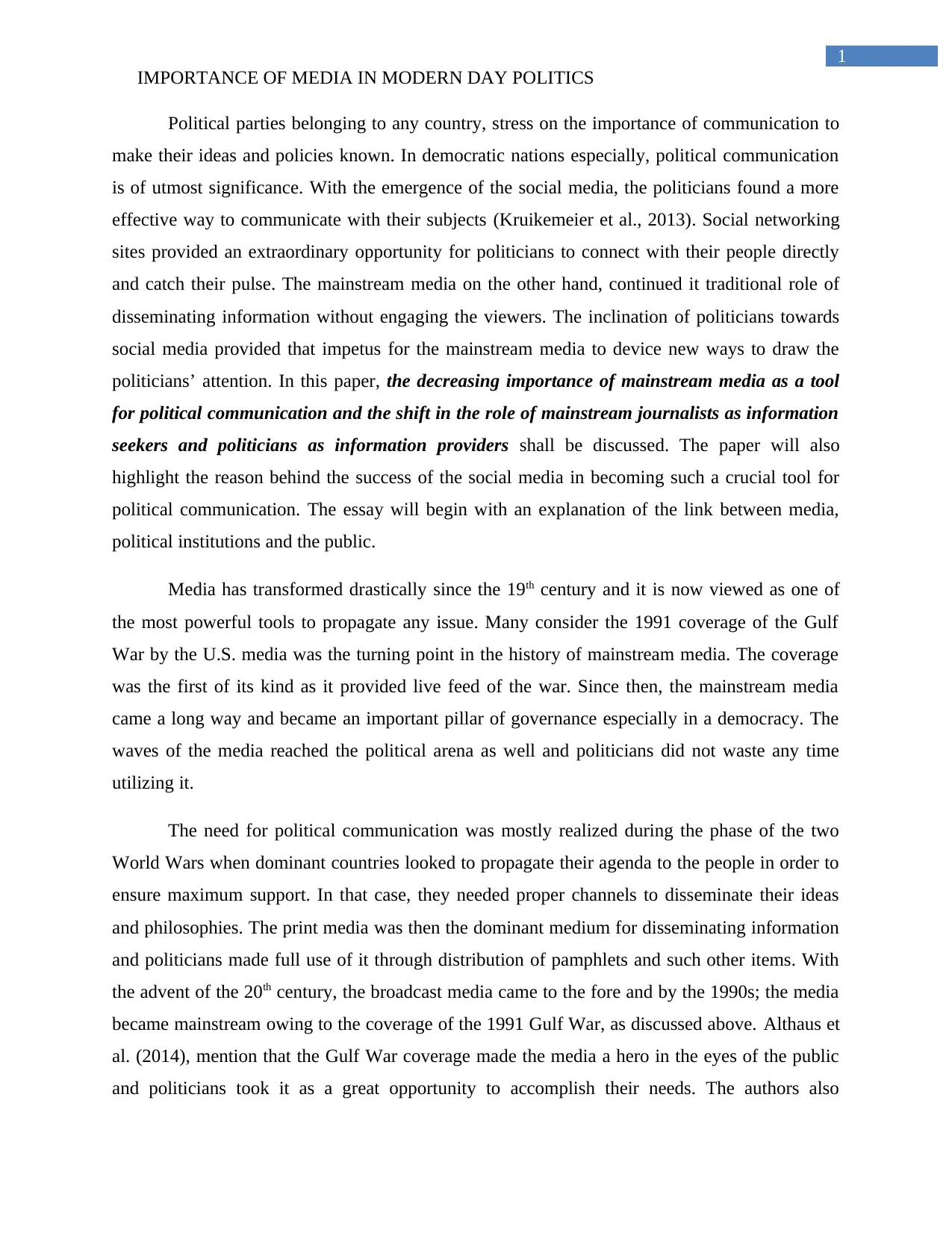
1
IMPORTANCE OF MEDIA IN MODERN DAY POLITICS
Political parties belonging to any country, stress on the importance of communication to
make their ideas and policies known. In democratic nations especially, political communication
is of utmost significance. With the emergence of the social media, the politicians found a more
effective way to communicate with their subjects (Kruikemeier et al., 2013). Social networking
sites provided an extraordinary opportunity for politicians to connect with their people directly
and catch their pulse. The mainstream media on the other hand, continued it traditional role of
disseminating information without engaging the viewers. The inclination of politicians towards
social media provided that impetus for the mainstream media to device new ways to draw the
politicians’ attention. In this paper, the decreasing importance of mainstream media as a tool
for political communication and the shift in the role of mainstream journalists as information
seekers and politicians as information providers shall be discussed. The paper will also
highlight the reason behind the success of the social media in becoming such a crucial tool for
political communication. The essay will begin with an explanation of the link between media,
political institutions and the public.
Media has transformed drastically since the 19th century and it is now viewed as one of
the most powerful tools to propagate any issue. Many consider the 1991 coverage of the Gulf
War by the U.S. media was the turning point in the history of mainstream media. The coverage
was the first of its kind as it provided live feed of the war. Since then, the mainstream media
came a long way and became an important pillar of governance especially in a democracy. The
waves of the media reached the political arena as well and politicians did not waste any time
utilizing it.
The need for political communication was mostly realized during the phase of the two
World Wars when dominant countries looked to propagate their agenda to the people in order to
ensure maximum support. In that case, they needed proper channels to disseminate their ideas
and philosophies. The print media was then the dominant medium for disseminating information
and politicians made full use of it through distribution of pamphlets and such other items. With
the advent of the 20th century, the broadcast media came to the fore and by the 1990s; the media
became mainstream owing to the coverage of the 1991 Gulf War, as discussed above. Althaus et
al. (2014), mention that the Gulf War coverage made the media a hero in the eyes of the public
and politicians took it as a great opportunity to accomplish their needs. The authors also
IMPORTANCE OF MEDIA IN MODERN DAY POLITICS
Political parties belonging to any country, stress on the importance of communication to
make their ideas and policies known. In democratic nations especially, political communication
is of utmost significance. With the emergence of the social media, the politicians found a more
effective way to communicate with their subjects (Kruikemeier et al., 2013). Social networking
sites provided an extraordinary opportunity for politicians to connect with their people directly
and catch their pulse. The mainstream media on the other hand, continued it traditional role of
disseminating information without engaging the viewers. The inclination of politicians towards
social media provided that impetus for the mainstream media to device new ways to draw the
politicians’ attention. In this paper, the decreasing importance of mainstream media as a tool
for political communication and the shift in the role of mainstream journalists as information
seekers and politicians as information providers shall be discussed. The paper will also
highlight the reason behind the success of the social media in becoming such a crucial tool for
political communication. The essay will begin with an explanation of the link between media,
political institutions and the public.
Media has transformed drastically since the 19th century and it is now viewed as one of
the most powerful tools to propagate any issue. Many consider the 1991 coverage of the Gulf
War by the U.S. media was the turning point in the history of mainstream media. The coverage
was the first of its kind as it provided live feed of the war. Since then, the mainstream media
came a long way and became an important pillar of governance especially in a democracy. The
waves of the media reached the political arena as well and politicians did not waste any time
utilizing it.
The need for political communication was mostly realized during the phase of the two
World Wars when dominant countries looked to propagate their agenda to the people in order to
ensure maximum support. In that case, they needed proper channels to disseminate their ideas
and philosophies. The print media was then the dominant medium for disseminating information
and politicians made full use of it through distribution of pamphlets and such other items. With
the advent of the 20th century, the broadcast media came to the fore and by the 1990s; the media
became mainstream owing to the coverage of the 1991 Gulf War, as discussed above. Althaus et
al. (2014), mention that the Gulf War coverage made the media a hero in the eyes of the public
and politicians took it as a great opportunity to accomplish their needs. The authors also
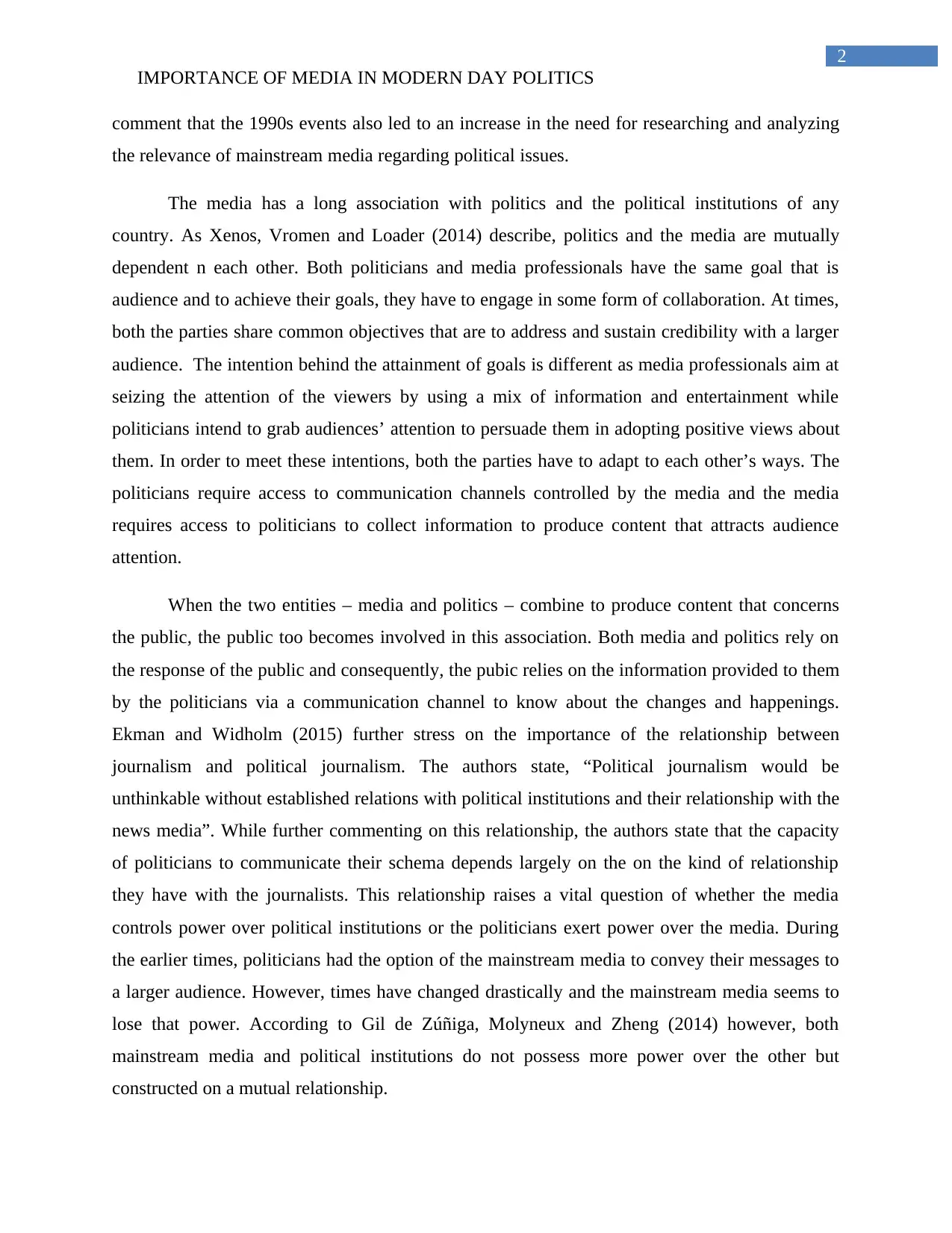
2
IMPORTANCE OF MEDIA IN MODERN DAY POLITICS
comment that the 1990s events also led to an increase in the need for researching and analyzing
the relevance of mainstream media regarding political issues.
The media has a long association with politics and the political institutions of any
country. As Xenos, Vromen and Loader (2014) describe, politics and the media are mutually
dependent n each other. Both politicians and media professionals have the same goal that is
audience and to achieve their goals, they have to engage in some form of collaboration. At times,
both the parties share common objectives that are to address and sustain credibility with a larger
audience. The intention behind the attainment of goals is different as media professionals aim at
seizing the attention of the viewers by using a mix of information and entertainment while
politicians intend to grab audiences’ attention to persuade them in adopting positive views about
them. In order to meet these intentions, both the parties have to adapt to each other’s ways. The
politicians require access to communication channels controlled by the media and the media
requires access to politicians to collect information to produce content that attracts audience
attention.
When the two entities – media and politics – combine to produce content that concerns
the public, the public too becomes involved in this association. Both media and politics rely on
the response of the public and consequently, the pubic relies on the information provided to them
by the politicians via a communication channel to know about the changes and happenings.
Ekman and Widholm (2015) further stress on the importance of the relationship between
journalism and political journalism. The authors state, “Political journalism would be
unthinkable without established relations with political institutions and their relationship with the
news media”. While further commenting on this relationship, the authors state that the capacity
of politicians to communicate their schema depends largely on the on the kind of relationship
they have with the journalists. This relationship raises a vital question of whether the media
controls power over political institutions or the politicians exert power over the media. During
the earlier times, politicians had the option of the mainstream media to convey their messages to
a larger audience. However, times have changed drastically and the mainstream media seems to
lose that power. According to Gil de Zúñiga, Molyneux and Zheng (2014) however, both
mainstream media and political institutions do not possess more power over the other but
constructed on a mutual relationship.
IMPORTANCE OF MEDIA IN MODERN DAY POLITICS
comment that the 1990s events also led to an increase in the need for researching and analyzing
the relevance of mainstream media regarding political issues.
The media has a long association with politics and the political institutions of any
country. As Xenos, Vromen and Loader (2014) describe, politics and the media are mutually
dependent n each other. Both politicians and media professionals have the same goal that is
audience and to achieve their goals, they have to engage in some form of collaboration. At times,
both the parties share common objectives that are to address and sustain credibility with a larger
audience. The intention behind the attainment of goals is different as media professionals aim at
seizing the attention of the viewers by using a mix of information and entertainment while
politicians intend to grab audiences’ attention to persuade them in adopting positive views about
them. In order to meet these intentions, both the parties have to adapt to each other’s ways. The
politicians require access to communication channels controlled by the media and the media
requires access to politicians to collect information to produce content that attracts audience
attention.
When the two entities – media and politics – combine to produce content that concerns
the public, the public too becomes involved in this association. Both media and politics rely on
the response of the public and consequently, the pubic relies on the information provided to them
by the politicians via a communication channel to know about the changes and happenings.
Ekman and Widholm (2015) further stress on the importance of the relationship between
journalism and political journalism. The authors state, “Political journalism would be
unthinkable without established relations with political institutions and their relationship with the
news media”. While further commenting on this relationship, the authors state that the capacity
of politicians to communicate their schema depends largely on the on the kind of relationship
they have with the journalists. This relationship raises a vital question of whether the media
controls power over political institutions or the politicians exert power over the media. During
the earlier times, politicians had the option of the mainstream media to convey their messages to
a larger audience. However, times have changed drastically and the mainstream media seems to
lose that power. According to Gil de Zúñiga, Molyneux and Zheng (2014) however, both
mainstream media and political institutions do not possess more power over the other but
constructed on a mutual relationship.
⊘ This is a preview!⊘
Do you want full access?
Subscribe today to unlock all pages.

Trusted by 1+ million students worldwide
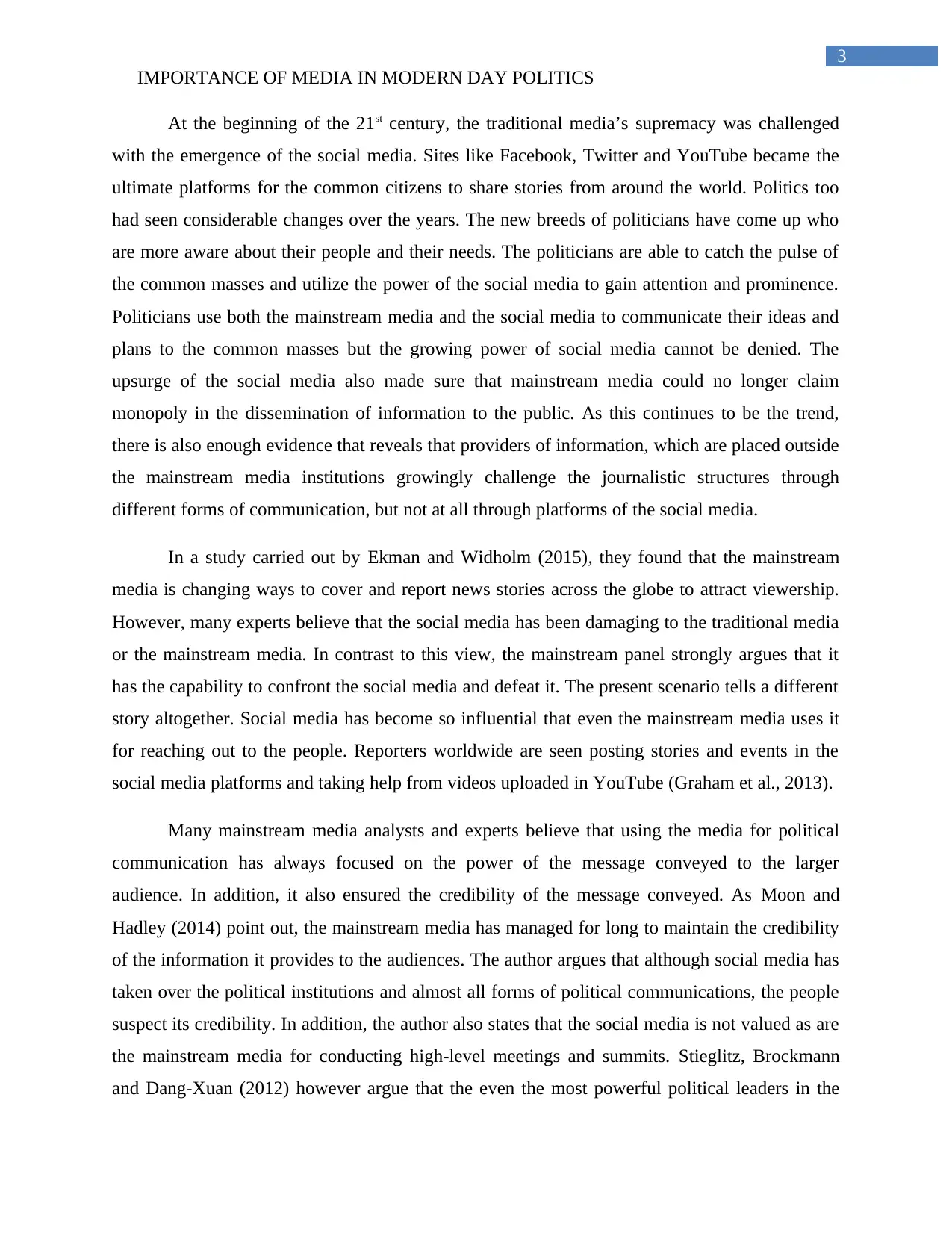
3
IMPORTANCE OF MEDIA IN MODERN DAY POLITICS
At the beginning of the 21st century, the traditional media’s supremacy was challenged
with the emergence of the social media. Sites like Facebook, Twitter and YouTube became the
ultimate platforms for the common citizens to share stories from around the world. Politics too
had seen considerable changes over the years. The new breeds of politicians have come up who
are more aware about their people and their needs. The politicians are able to catch the pulse of
the common masses and utilize the power of the social media to gain attention and prominence.
Politicians use both the mainstream media and the social media to communicate their ideas and
plans to the common masses but the growing power of social media cannot be denied. The
upsurge of the social media also made sure that mainstream media could no longer claim
monopoly in the dissemination of information to the public. As this continues to be the trend,
there is also enough evidence that reveals that providers of information, which are placed outside
the mainstream media institutions growingly challenge the journalistic structures through
different forms of communication, but not at all through platforms of the social media.
In a study carried out by Ekman and Widholm (2015), they found that the mainstream
media is changing ways to cover and report news stories across the globe to attract viewership.
However, many experts believe that the social media has been damaging to the traditional media
or the mainstream media. In contrast to this view, the mainstream panel strongly argues that it
has the capability to confront the social media and defeat it. The present scenario tells a different
story altogether. Social media has become so influential that even the mainstream media uses it
for reaching out to the people. Reporters worldwide are seen posting stories and events in the
social media platforms and taking help from videos uploaded in YouTube (Graham et al., 2013).
Many mainstream media analysts and experts believe that using the media for political
communication has always focused on the power of the message conveyed to the larger
audience. In addition, it also ensured the credibility of the message conveyed. As Moon and
Hadley (2014) point out, the mainstream media has managed for long to maintain the credibility
of the information it provides to the audiences. The author argues that although social media has
taken over the political institutions and almost all forms of political communications, the people
suspect its credibility. In addition, the author also states that the social media is not valued as are
the mainstream media for conducting high-level meetings and summits. Stieglitz, Brockmann
and Dang-Xuan (2012) however argue that the even the most powerful political leaders in the
IMPORTANCE OF MEDIA IN MODERN DAY POLITICS
At the beginning of the 21st century, the traditional media’s supremacy was challenged
with the emergence of the social media. Sites like Facebook, Twitter and YouTube became the
ultimate platforms for the common citizens to share stories from around the world. Politics too
had seen considerable changes over the years. The new breeds of politicians have come up who
are more aware about their people and their needs. The politicians are able to catch the pulse of
the common masses and utilize the power of the social media to gain attention and prominence.
Politicians use both the mainstream media and the social media to communicate their ideas and
plans to the common masses but the growing power of social media cannot be denied. The
upsurge of the social media also made sure that mainstream media could no longer claim
monopoly in the dissemination of information to the public. As this continues to be the trend,
there is also enough evidence that reveals that providers of information, which are placed outside
the mainstream media institutions growingly challenge the journalistic structures through
different forms of communication, but not at all through platforms of the social media.
In a study carried out by Ekman and Widholm (2015), they found that the mainstream
media is changing ways to cover and report news stories across the globe to attract viewership.
However, many experts believe that the social media has been damaging to the traditional media
or the mainstream media. In contrast to this view, the mainstream panel strongly argues that it
has the capability to confront the social media and defeat it. The present scenario tells a different
story altogether. Social media has become so influential that even the mainstream media uses it
for reaching out to the people. Reporters worldwide are seen posting stories and events in the
social media platforms and taking help from videos uploaded in YouTube (Graham et al., 2013).
Many mainstream media analysts and experts believe that using the media for political
communication has always focused on the power of the message conveyed to the larger
audience. In addition, it also ensured the credibility of the message conveyed. As Moon and
Hadley (2014) point out, the mainstream media has managed for long to maintain the credibility
of the information it provides to the audiences. The author argues that although social media has
taken over the political institutions and almost all forms of political communications, the people
suspect its credibility. In addition, the author also states that the social media is not valued as are
the mainstream media for conducting high-level meetings and summits. Stieglitz, Brockmann
and Dang-Xuan (2012) however argue that the even the most powerful political leaders in the
Paraphrase This Document
Need a fresh take? Get an instant paraphrase of this document with our AI Paraphraser
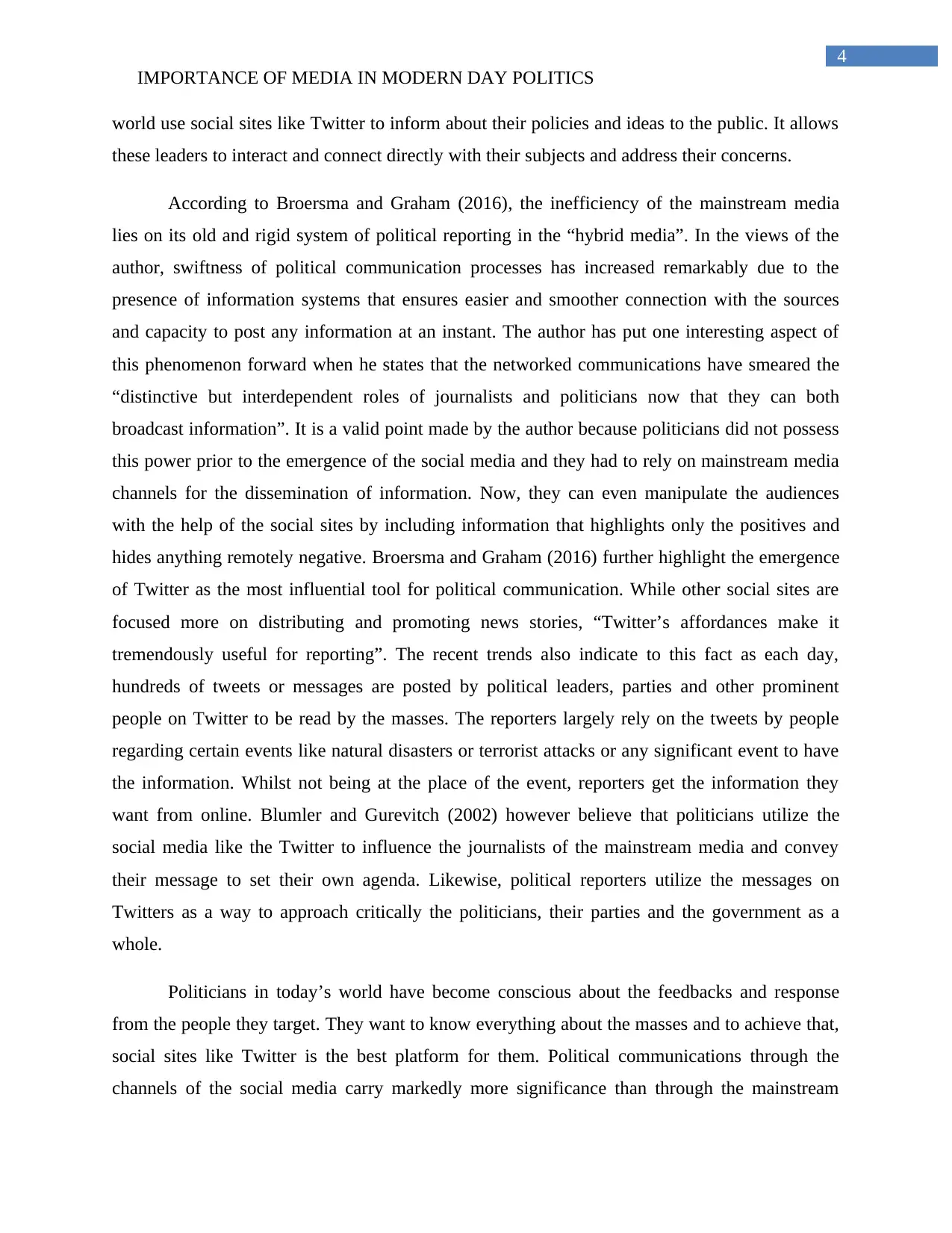
4
IMPORTANCE OF MEDIA IN MODERN DAY POLITICS
world use social sites like Twitter to inform about their policies and ideas to the public. It allows
these leaders to interact and connect directly with their subjects and address their concerns.
According to Broersma and Graham (2016), the inefficiency of the mainstream media
lies on its old and rigid system of political reporting in the “hybrid media”. In the views of the
author, swiftness of political communication processes has increased remarkably due to the
presence of information systems that ensures easier and smoother connection with the sources
and capacity to post any information at an instant. The author has put one interesting aspect of
this phenomenon forward when he states that the networked communications have smeared the
“distinctive but interdependent roles of journalists and politicians now that they can both
broadcast information”. It is a valid point made by the author because politicians did not possess
this power prior to the emergence of the social media and they had to rely on mainstream media
channels for the dissemination of information. Now, they can even manipulate the audiences
with the help of the social sites by including information that highlights only the positives and
hides anything remotely negative. Broersma and Graham (2016) further highlight the emergence
of Twitter as the most influential tool for political communication. While other social sites are
focused more on distributing and promoting news stories, “Twitter’s affordances make it
tremendously useful for reporting”. The recent trends also indicate to this fact as each day,
hundreds of tweets or messages are posted by political leaders, parties and other prominent
people on Twitter to be read by the masses. The reporters largely rely on the tweets by people
regarding certain events like natural disasters or terrorist attacks or any significant event to have
the information. Whilst not being at the place of the event, reporters get the information they
want from online. Blumler and Gurevitch (2002) however believe that politicians utilize the
social media like the Twitter to influence the journalists of the mainstream media and convey
their message to set their own agenda. Likewise, political reporters utilize the messages on
Twitters as a way to approach critically the politicians, their parties and the government as a
whole.
Politicians in today’s world have become conscious about the feedbacks and response
from the people they target. They want to know everything about the masses and to achieve that,
social sites like Twitter is the best platform for them. Political communications through the
channels of the social media carry markedly more significance than through the mainstream
IMPORTANCE OF MEDIA IN MODERN DAY POLITICS
world use social sites like Twitter to inform about their policies and ideas to the public. It allows
these leaders to interact and connect directly with their subjects and address their concerns.
According to Broersma and Graham (2016), the inefficiency of the mainstream media
lies on its old and rigid system of political reporting in the “hybrid media”. In the views of the
author, swiftness of political communication processes has increased remarkably due to the
presence of information systems that ensures easier and smoother connection with the sources
and capacity to post any information at an instant. The author has put one interesting aspect of
this phenomenon forward when he states that the networked communications have smeared the
“distinctive but interdependent roles of journalists and politicians now that they can both
broadcast information”. It is a valid point made by the author because politicians did not possess
this power prior to the emergence of the social media and they had to rely on mainstream media
channels for the dissemination of information. Now, they can even manipulate the audiences
with the help of the social sites by including information that highlights only the positives and
hides anything remotely negative. Broersma and Graham (2016) further highlight the emergence
of Twitter as the most influential tool for political communication. While other social sites are
focused more on distributing and promoting news stories, “Twitter’s affordances make it
tremendously useful for reporting”. The recent trends also indicate to this fact as each day,
hundreds of tweets or messages are posted by political leaders, parties and other prominent
people on Twitter to be read by the masses. The reporters largely rely on the tweets by people
regarding certain events like natural disasters or terrorist attacks or any significant event to have
the information. Whilst not being at the place of the event, reporters get the information they
want from online. Blumler and Gurevitch (2002) however believe that politicians utilize the
social media like the Twitter to influence the journalists of the mainstream media and convey
their message to set their own agenda. Likewise, political reporters utilize the messages on
Twitters as a way to approach critically the politicians, their parties and the government as a
whole.
Politicians in today’s world have become conscious about the feedbacks and response
from the people they target. They want to know everything about the masses and to achieve that,
social sites like Twitter is the best platform for them. Political communications through the
channels of the social media carry markedly more significance than through the mainstream
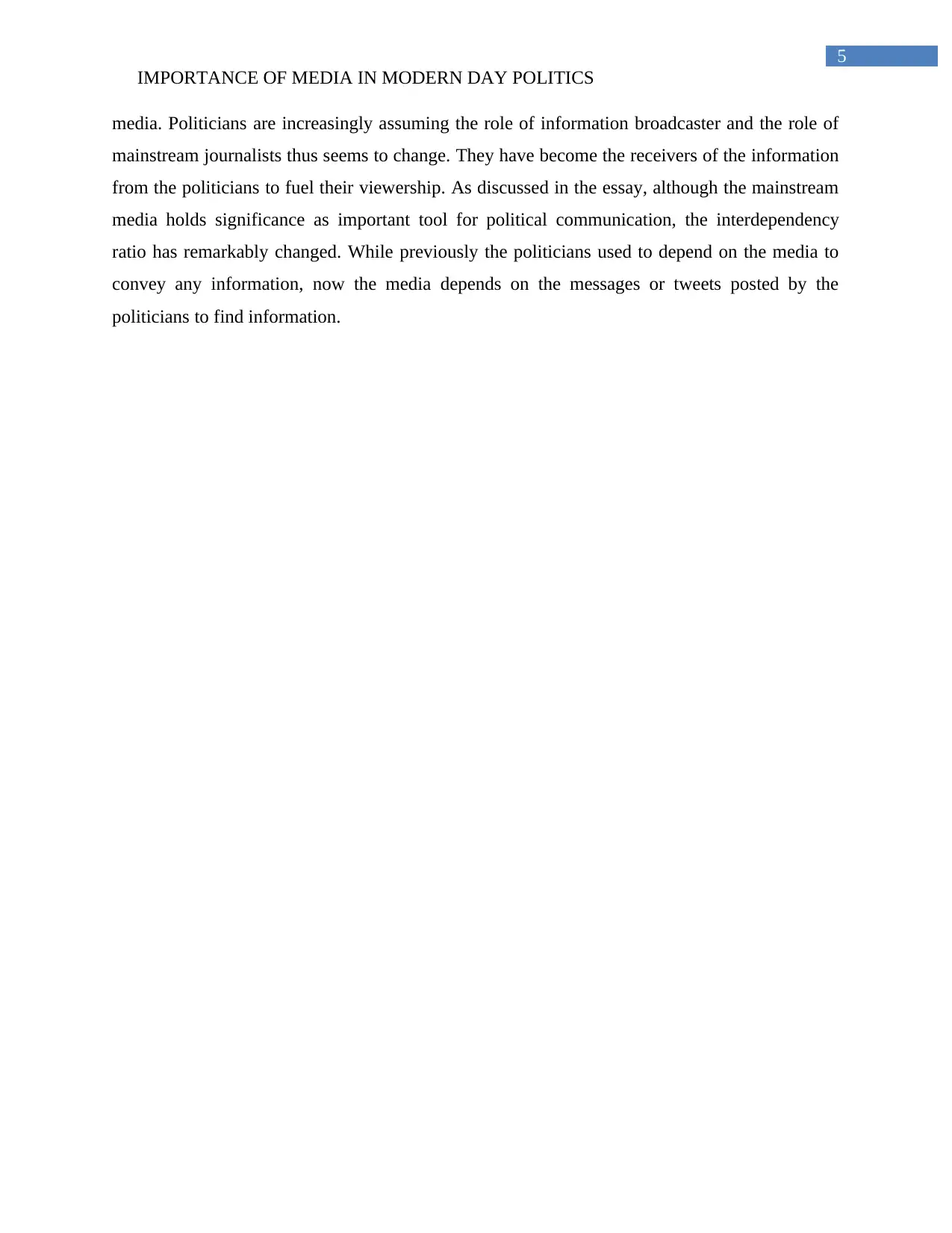
5
IMPORTANCE OF MEDIA IN MODERN DAY POLITICS
media. Politicians are increasingly assuming the role of information broadcaster and the role of
mainstream journalists thus seems to change. They have become the receivers of the information
from the politicians to fuel their viewership. As discussed in the essay, although the mainstream
media holds significance as important tool for political communication, the interdependency
ratio has remarkably changed. While previously the politicians used to depend on the media to
convey any information, now the media depends on the messages or tweets posted by the
politicians to find information.
IMPORTANCE OF MEDIA IN MODERN DAY POLITICS
media. Politicians are increasingly assuming the role of information broadcaster and the role of
mainstream journalists thus seems to change. They have become the receivers of the information
from the politicians to fuel their viewership. As discussed in the essay, although the mainstream
media holds significance as important tool for political communication, the interdependency
ratio has remarkably changed. While previously the politicians used to depend on the media to
convey any information, now the media depends on the messages or tweets posted by the
politicians to find information.
⊘ This is a preview!⊘
Do you want full access?
Subscribe today to unlock all pages.

Trusted by 1+ million students worldwide
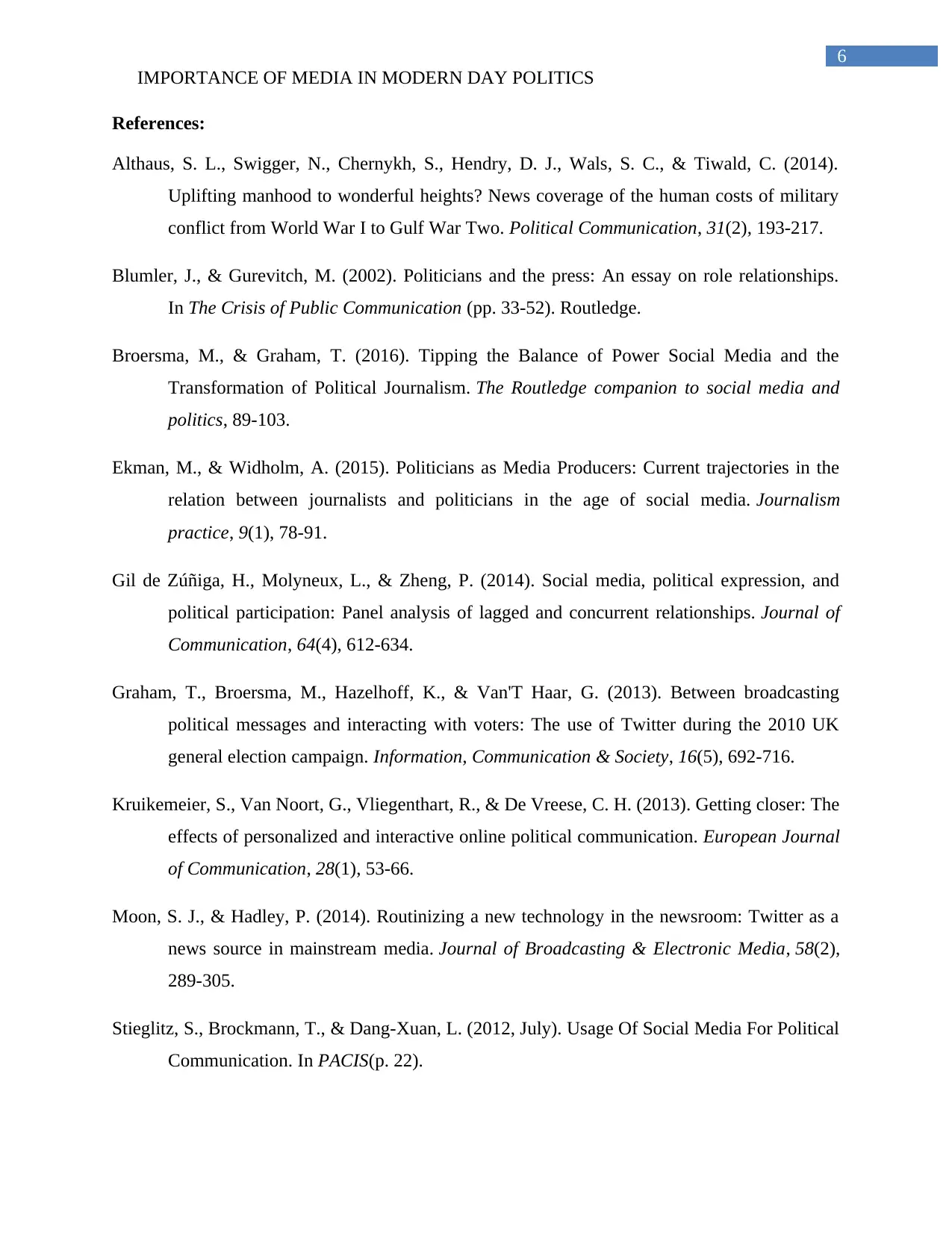
6
IMPORTANCE OF MEDIA IN MODERN DAY POLITICS
References:
Althaus, S. L., Swigger, N., Chernykh, S., Hendry, D. J., Wals, S. C., & Tiwald, C. (2014).
Uplifting manhood to wonderful heights? News coverage of the human costs of military
conflict from World War I to Gulf War Two. Political Communication, 31(2), 193-217.
Blumler, J., & Gurevitch, M. (2002). Politicians and the press: An essay on role relationships.
In The Crisis of Public Communication (pp. 33-52). Routledge.
Broersma, M., & Graham, T. (2016). Tipping the Balance of Power Social Media and the
Transformation of Political Journalism. The Routledge companion to social media and
politics, 89-103.
Ekman, M., & Widholm, A. (2015). Politicians as Media Producers: Current trajectories in the
relation between journalists and politicians in the age of social media. Journalism
practice, 9(1), 78-91.
Gil de Zúñiga, H., Molyneux, L., & Zheng, P. (2014). Social media, political expression, and
political participation: Panel analysis of lagged and concurrent relationships. Journal of
Communication, 64(4), 612-634.
Graham, T., Broersma, M., Hazelhoff, K., & Van'T Haar, G. (2013). Between broadcasting
political messages and interacting with voters: The use of Twitter during the 2010 UK
general election campaign. Information, Communication & Society, 16(5), 692-716.
Kruikemeier, S., Van Noort, G., Vliegenthart, R., & De Vreese, C. H. (2013). Getting closer: The
effects of personalized and interactive online political communication. European Journal
of Communication, 28(1), 53-66.
Moon, S. J., & Hadley, P. (2014). Routinizing a new technology in the newsroom: Twitter as a
news source in mainstream media. Journal of Broadcasting & Electronic Media, 58(2),
289-305.
Stieglitz, S., Brockmann, T., & Dang-Xuan, L. (2012, July). Usage Of Social Media For Political
Communication. In PACIS(p. 22).
IMPORTANCE OF MEDIA IN MODERN DAY POLITICS
References:
Althaus, S. L., Swigger, N., Chernykh, S., Hendry, D. J., Wals, S. C., & Tiwald, C. (2014).
Uplifting manhood to wonderful heights? News coverage of the human costs of military
conflict from World War I to Gulf War Two. Political Communication, 31(2), 193-217.
Blumler, J., & Gurevitch, M. (2002). Politicians and the press: An essay on role relationships.
In The Crisis of Public Communication (pp. 33-52). Routledge.
Broersma, M., & Graham, T. (2016). Tipping the Balance of Power Social Media and the
Transformation of Political Journalism. The Routledge companion to social media and
politics, 89-103.
Ekman, M., & Widholm, A. (2015). Politicians as Media Producers: Current trajectories in the
relation between journalists and politicians in the age of social media. Journalism
practice, 9(1), 78-91.
Gil de Zúñiga, H., Molyneux, L., & Zheng, P. (2014). Social media, political expression, and
political participation: Panel analysis of lagged and concurrent relationships. Journal of
Communication, 64(4), 612-634.
Graham, T., Broersma, M., Hazelhoff, K., & Van'T Haar, G. (2013). Between broadcasting
political messages and interacting with voters: The use of Twitter during the 2010 UK
general election campaign. Information, Communication & Society, 16(5), 692-716.
Kruikemeier, S., Van Noort, G., Vliegenthart, R., & De Vreese, C. H. (2013). Getting closer: The
effects of personalized and interactive online political communication. European Journal
of Communication, 28(1), 53-66.
Moon, S. J., & Hadley, P. (2014). Routinizing a new technology in the newsroom: Twitter as a
news source in mainstream media. Journal of Broadcasting & Electronic Media, 58(2),
289-305.
Stieglitz, S., Brockmann, T., & Dang-Xuan, L. (2012, July). Usage Of Social Media For Political
Communication. In PACIS(p. 22).
Paraphrase This Document
Need a fresh take? Get an instant paraphrase of this document with our AI Paraphraser
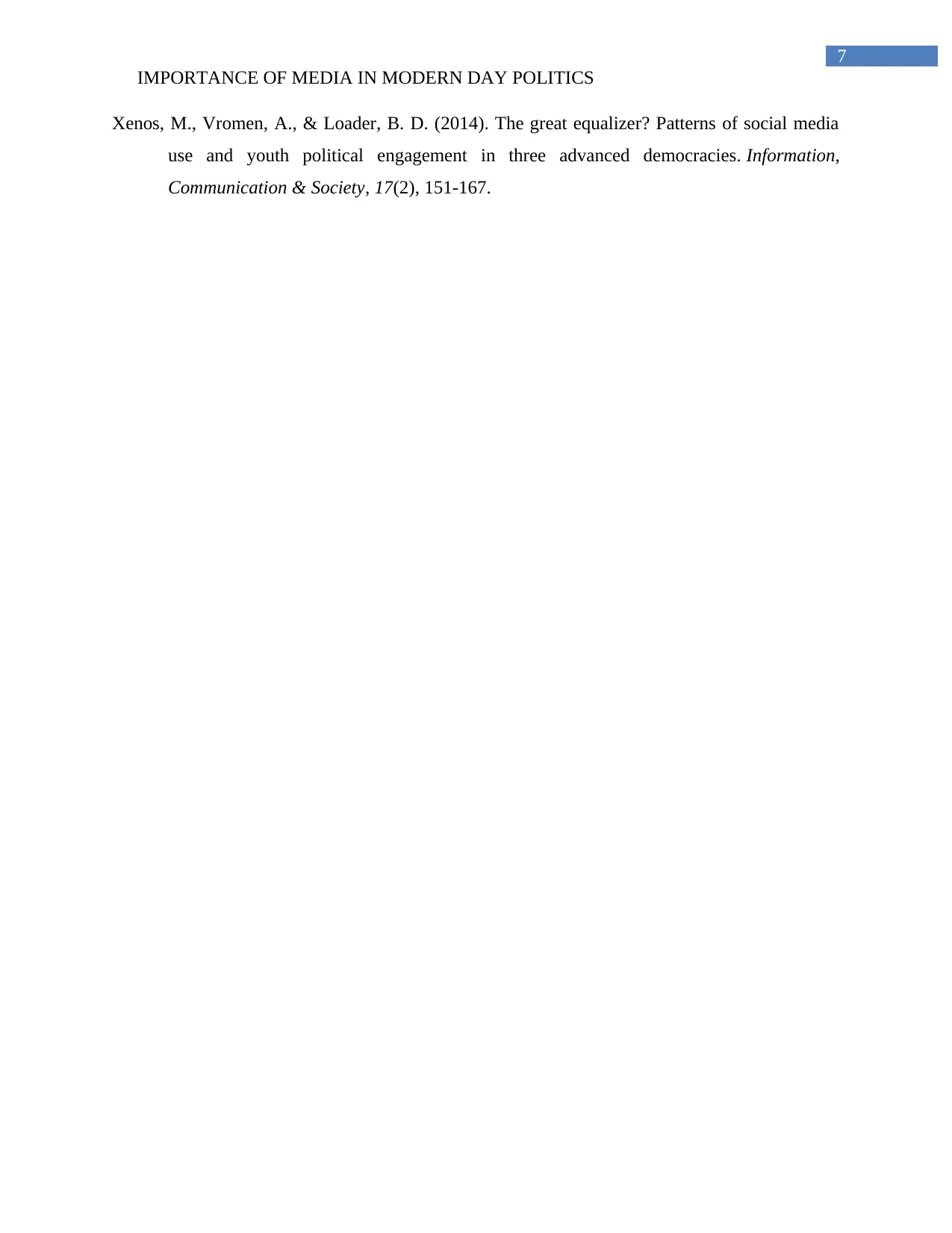
7
IMPORTANCE OF MEDIA IN MODERN DAY POLITICS
Xenos, M., Vromen, A., & Loader, B. D. (2014). The great equalizer? Patterns of social media
use and youth political engagement in three advanced democracies. Information,
Communication & Society, 17(2), 151-167.
IMPORTANCE OF MEDIA IN MODERN DAY POLITICS
Xenos, M., Vromen, A., & Loader, B. D. (2014). The great equalizer? Patterns of social media
use and youth political engagement in three advanced democracies. Information,
Communication & Society, 17(2), 151-167.
1 out of 8
Related Documents
Your All-in-One AI-Powered Toolkit for Academic Success.
+13062052269
info@desklib.com
Available 24*7 on WhatsApp / Email
![[object Object]](/_next/static/media/star-bottom.7253800d.svg)
Unlock your academic potential
Copyright © 2020–2026 A2Z Services. All Rights Reserved. Developed and managed by ZUCOL.



